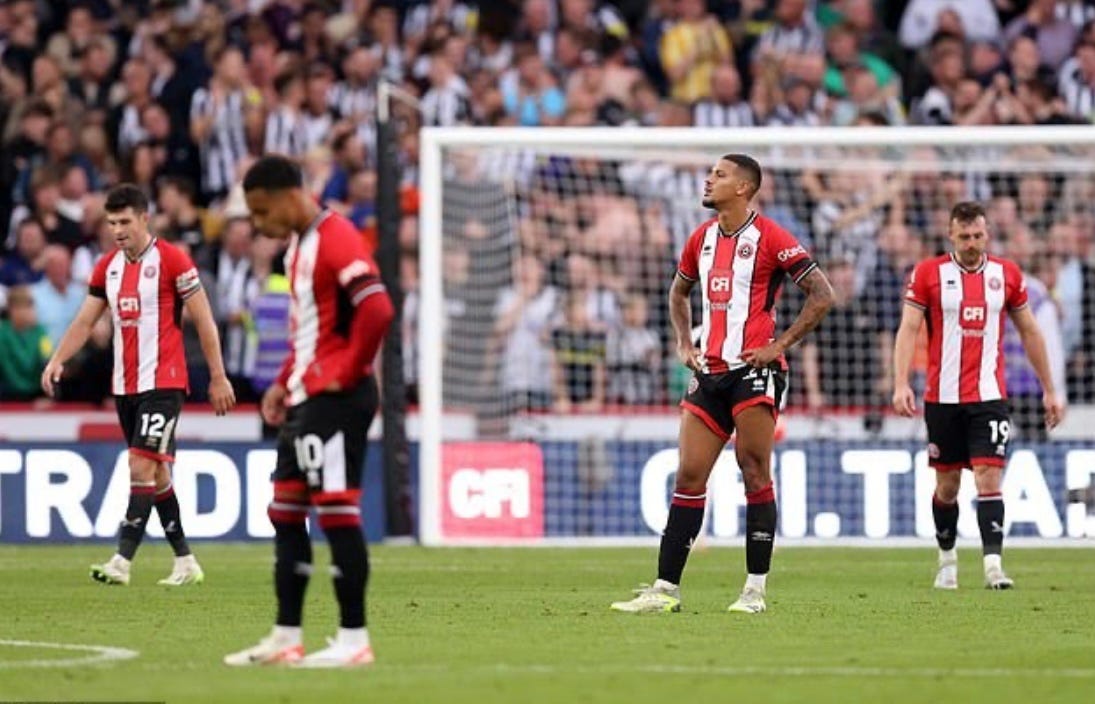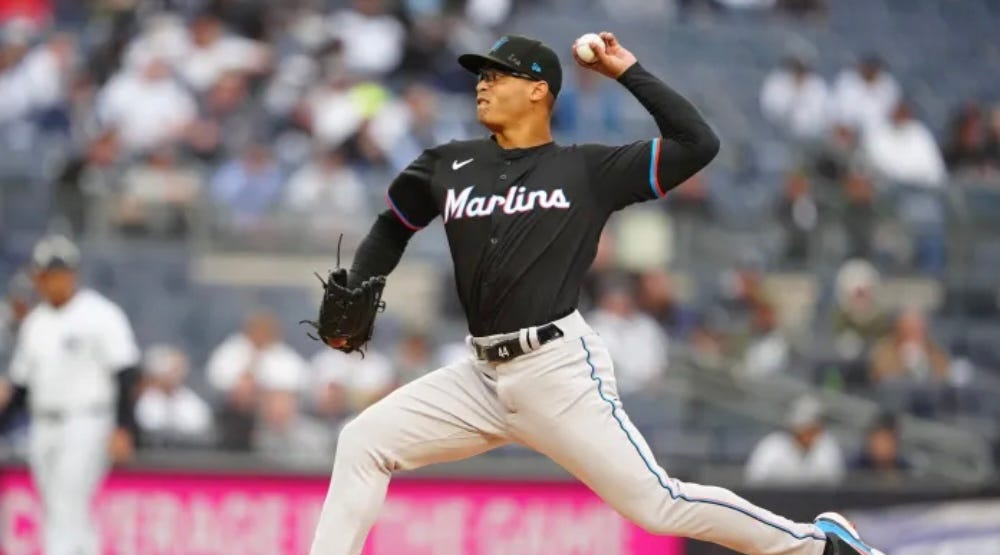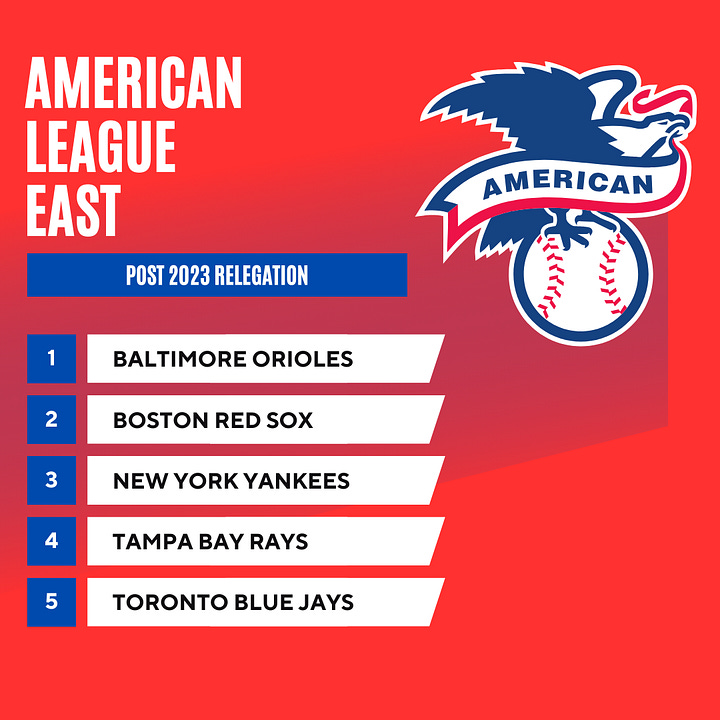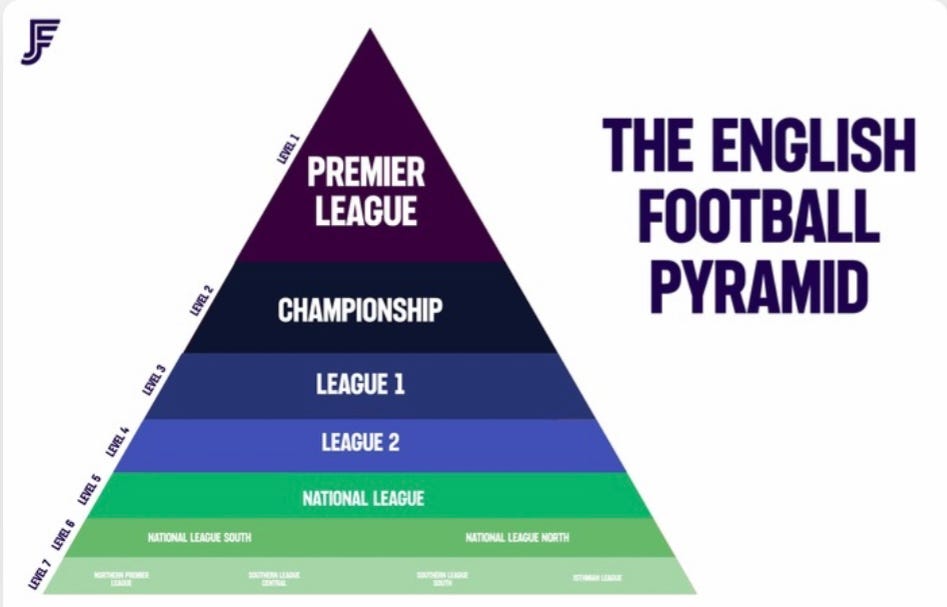Win...Or else!
A VFTB proposal that would radically overhaul the way some major league clubs do business

What if I told you there could be a system in which your favorite team had no choice but to do everything in its power to win every single season, a system in which the Marlins and the Athletics had to aim just as high annually as the Dodgers and Yankees?
A system in which no team could throw in the towel on a season on May 3?
Say goodbye to tanking.
Say goodbye to 5-year plans.
Say hello to win…or else.
I’m not suggesting this will ever happen, but the Marlins beginning a rebuild 34 games into a season got me thinking, and I can make a pretty good argument it would make Major League Baseball significantly more interesting and significantly more competitive.
I’ve devised the fantastical framework for a proposal in which MLB adopts a system of promotion and relegation, similar to what you see in European football. If you’re the Dodgers and Yankees (or Manchester City and Liverpool), you’ve got nothing to worry about. But if you’re the White Sox and Rockies (or Nottingham Forest and Brentford), the heat would have just gotten turned up dramatically.
If you’re unfamiliar with the English Football Pyramid (which is representative of most European football structures), it’s a tiered system, with the Premier League at the top. The pyramid descends to the Championship (2nd division), to League 1 (3rd division), to League 2 (4th division) to the National League (5th division) and continues all the way down to several regional feeder leagues as you move toward the bottom.
Theoretically, there’s a scenario where 11 guys kicking a ball around in a pasture in Surrey a couple of days a week could, over many years, climb all the way to the Premier League and get chills while 61,000 sing You’ll Never Walk Alone just before kickoff at Anfield.
After all, at the end of a storm is a golden sky and the sweet silver song of a lark.
On an annual basis, teams that finish at the bottom of each league in the English pyramid are relegated to the league below for the following season, replaced in the higher league by clubs that finished at the top of the division immediately below.
The bottom 3 finishers in the Premier League this season will be relegated to the Championship for next season. They’ll be replaced at the highest level of English football by 3 teams promoted from the Championship, the 2nd-division league. The 3 teams that finish at the bottom of the Championship will get relegated to League 1 for next season, replaced by League 1’s 3 best teams from this season.
This system of promotion and relegation goes all the way down the line…all the way to the aforementioned pasture in Surrey.
If you’d like to see how the system of promotion and relegation ratchets up the passion and intensity of players and fans, I highly recommend you watch FX’s Welcome to Wrexham (streaming on Hulu) from the beginning.
Promotion up the pyramid means huge financial gain and increased status. Relegation down the ladder means a major fiscal and reputational hit.
Some teams yo-yo between levels. They’re good enough to get promoted but not good enough to stay for more than a season or 2 at a time. It’s similar to what we’d call a “4-A player” in baseball, someone who tears it up in Triple-A but just can’t hold on to a big league job when he gets a shot.
Other teams in the English Football pyramid are simply mired in the middle of their league for years with only passing hope of promotion and occasional fear of relegation. It’s similar to the journeyman Triple-A ballplayer who just keeps holding on. In Toledo one year, Tacoma the next.

So what does this have to do with Major League Baseball?
My proposal doesn’t call for the Athletics to get banished to the Pacific Coast League for finishing last in the AL West or for the Rochester Red Wings to get promoted to the majors for winning the International League.
The minor league system as we know it wouldn’t change at all in my plan to introduce promotion and relegation to Major League Baseball.
What I propose—and I’ll again acknowledge this will never happen—is to create a league between the Major Leagues and Triple-A. For lack of a better name, I’m going to call it League 1 for now. It will be run under the auspices of Major League Baseball, just as each of the affiliated minor leagues now are.
This radical plan doesn’t get implemented overnight. I propose that it be implemented 5 years after it’s announced, giving each of the 30 current major league clubs a 5-year runway to put its best foot forward (i.e. for all of them to do what you wish they would already be doing).
Here’s how I propose it works in conjunction with 2 expansion teams joining our 2-tiered Baseball pyramid, bringing the pool of clubs with which we’d be working to 32:
At the end of the final season of the current 30-team MLB format (year 5 of the runway to a new era), the 10 teams with the worst records in the majors (regardless of leagues or divisions) will be relegated to League 1 for the following season.
Yeah, it’s dramatic. Some might call it crazy. But you’ve got to start somewhere, and you guys had 5 years to build a club that would not be at the bottom of the sport.
Those 10 clubs will be joined in the inaugural season of League 1 play by the 2 first-year expansion franchises.
You don’t like starting in League 1, Nashville? OK. On to the next expansion hopeful. Salt Lake City said they’d be happy to have the opportunity to try to earn promotion. You want an expansion franchise? You’ve got to pay your expansion fee. You’ve got to build a ballpark. And you’ve got to agree to work your way up from League 1.
So what you end up with is 20 teams in MLB, 2 divisions with 5 teams each in the American League and 2 divisions with 5 teams each in the National League.
Just below, you have 2 divisions of 6 teams each in League 1.
At the end of every ensuing MLB season, the last-place team in each of the 4 divisions is relegated to League 1.
You could go with the 4 worst records regardless of division, but I like the simplicity of “You finish last, you go down.”
At the end of every ensuing season, the 2 League One division champions earn automatic promotion to MLB for the following season.
Who joins them in making the jump?
The 4 non-division champions that finish with the best records in League One (regardless of division) will play a best-of-7 series (#3 vs. #6 in one series and #4 vs. #5 in the other).
The 2 series winners are movin’ on up as they join the 2 division winners in earning promotion to MLB for the following season.
This same system plays out annually. 4 MLB teams at the bottom go down. 4 League 1 teams at the top go up.
Some teams may never face relegation. Some may see-saw up and down every couple of years. Some may be stuck in League 1. And some team could go from League 1 in one season to winning the World Series the next.
As for the MLB Playoff format under my proposal:
8 of the 20 teams would make the MLB playoffs each year, the same 40 percent ratio as in the current system in which 12 of 30 qualify to play in October.
The 4 division winners (2 in each league) earn a trip to the playoffs, as do 4 Wild Card teams (2 in each league). These are not necessarily the 2nd-place teams in each division. They are the 2 teams with the best record in each league that did not win their division.
You would then have a 3-tiered MLB postseason.
In the Division Series, the #1 seed in each league would play the #4 seed in its league in a best-of 7 series, while each league’s #2 and #3 seeds would also face off in a best-of-7.
The 2 series winners advance to the best-of-7 ALCS and NLCS, ahead of a best-of-7 World Series.
No more best-of-3 series. This system maximizes the chances of the best and deepest teams advancing.
How does this format impact television, one of the significant financial questions people would want answered?
This format would give you a maximum of 49 MLB post-season games each year (if every series went the distance) and a minimum of 28 games (if every series were a sweep).
The current format offers a maximum of 53 MLB post-season games and a minimum 32.
BUT if you add the League 1 Playoffs, which will be of huge importance because each series is essentially a mini-World Series with each winner rewarded with promotion, you would add a minimum of 8 more post-season games and a maximum of 14.
So you would actually add TV inventory for MLB to sell in this format.
PRIMARY BENEFITS OF THIS SYSTEM
This system 100 percent eliminates tanking.
Tanking—the practice of shedding a roster of high-priced players in exchange for young, less-accomplished talent to operate with a lower payroll, knowing your team is likely to lose a ton of games to receive favorable draft placement—has been a stain on the Game for more than a decade.
Sure there are examples of teams that tore it down to the studs, had a few 100-loss seasons, and eventually went on to win a World Series.
But there are far more clubs that have essentially lived in Baseball purgatory. They know they can’t compete with the big boys on an annual basis. They try to be savvy. They look for their potential windows. But at the end of the day, the cycle of trading arbitration-eligible contributors for an 18-year-old Rookie league outfielder who was killing it in the Dominican Summer League and then plugging a 4-A guy making the major league minimum into your big league lineup is no fun for anyone. And rarely is it productive.
You want to have a $63 million Opening Day payroll? Cool. You’ve probably just punched your ticket to League 1 for next year. You’re either going to spend more now to try to keep your spot among the 20 major league clubs, or you’re going to have to spend next year to try to get back to the big leagues.
Pay me now or pay me later.
This system also means that virtually every late-season game—even those played by teams at the bottom of the standings—matters.
Imagine the 72-87 Angels are hosting the 72-87 Athletics on the final weekend of the season. Everything will be on the line for those 2 teams at the bottom of the AL West. One will remain in the majors next season, while the other is headed to League 1.
Imagine a game on the final day of the season in which the winner stays and the loser gets relegated. It would be managed and played like it’s Game 7 of the World Series instead of just another game 162 yawner with a bunch of September call-ups swinging at the first pitch of every at-bat because everyone has a flight to catch to begin their offseason.
The team that wins 2 of 3 on that final weekend to finish 74-88 probably has a champagne celebration in its clubhouse.
That’s a lot more fun than the scene in the clubhouse of the team that wins on the final day to finish 74-88 now, players in front of their lockers, talking to cameras in hushed tones about all the one-run games that might have gone the other way and the need to improve their situational hitting next season.
This would be must-see TV.
Here’s the bottom line: I can’t see this ever happening.
There are things about this proposal that wouldn’t fly with ML owners, and there are things that would rile up the Players Association.
The truth is, while there are certainly negatives that could be pointed out regarding this proposal, there would be distinct advantages for both sides as well.
And not that this matters as much as it should to the lords of the Game, but I see this as a win for fans, especially those in markets where ownership is content to tread water and turn a profit while playing mediocre baseball year after year.
This system does little to impact teams that are perennial powers.
What it does is light a fire under the bottom feeders, the teams with owners who are content to cash their revenue sharing checks while droning endlessly about rebuilding their infrastructure so they might one day sustain success.
Suddenly, there'd be a forced sense of urgency.
If you root for one of those teams, your club would finally have no choice but to compete. The Marlins wouldn’t be trading Luis Arraez on May 3. They’d instead be frantically searching for more offense and some pitching help (something they should have been doing for the last year).
Teams like that would no longer be playing the long game, which sometimes never ends. They’d instead be actively fighting for their lives.
As I said 3 times already, I don’t see any way MLB adopts a system of promotion and relegation. But at a time when competitive integrity among all 30 clubs is an issue that detracts from the popularity of the sport, where some teams are glorified farm teams for others, it’s an idea that’s at least worthy of discussion.
What do you think? You like the idea? Is it the most absurd thing you’ve ever heard?
Let me know in the Comments below.
WHAT IF…
If 2023 had been the final season of the current 30-team format under my proposal, the 10 teams who would have been sent to League 1 for its inaugural season would have been:
Athletics
Royals
Rockies
White Sox
Nationals
Cardinals
Angels
Mets
Pirates
Guardians
The Red Sox and Tigers would have been just outside of relegation.
Here’s how the major leagues and League 1 might look the following season with the above relegations:






While you’re here…
Check out the premiere episode of my new Baseball podcast CROOKED NUMBERS and subscribe for free today on Spotify, Apple, Google Podcasts, Amazon Music, Audible, iHeart or wherever you get your podcasts.
Learn more about one-on-one play-by-play coaching from Glenn Geffner via Zoom at GlennGeffner.com.




It is a fun topic to discuss over drinks and dinner with baseball fan friends. Although I hardly watch soccer, I am vaguely aware of relegation. Frankly, I enjoyed the article and have already recommended it to my old guy friends. Our group is split rather evenly along the owner's-prerogative and fan-responsibility demarcation line. We know that MLB ownership would not acquiesce to the plan under any circumstances. so I also didn't think through the ramifications or any rebuttals. It's a creative and fun article, though.
For fans this would be exciting.